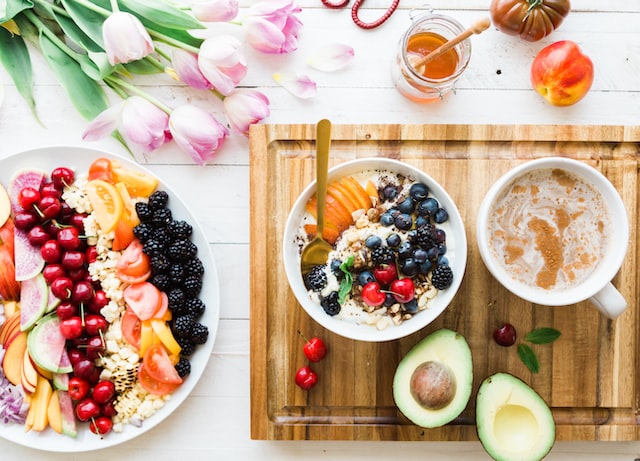Healthy eating habits to support peak performance

Healthy eating habits to support peak performance
Between a demanding work schedule, professional networking, a busy family life, an active social life, a dog that needs walking, a fitness routine, and indulging in episodes of Below Deck with the few spare minutes that remain in any given week, who has time to think about healthy eating, too?
Apparently, people who are interested in peak performance, because the science is clear that eating better means feeling better and doing better in all areas of life.
It’s been the focus of many studies investigating the reasons why people are cooking less. According to the National Library of Medicine, time scarcity and cooking skills were identified as common barriers to prepare home meals. But a tendency to skip the grocery store and opt to eat store bought meals, take-out or fast food can leave lingering issues. What kind of nutritional value does the meal out offer, what kind of preservatives are hiding in that granola bar advertised as a “healthy” option? With some dedication and persistence, simple swaps can mean new found energy.
While experts believe many factors like culture, economic status, and the psychology behind food relationships can influence feelings about food and eating behaviors, making time to get thoughtful and intentional about what women put into their bodies can influence every other aspect of their lives. Medical professionals know there is power in changing unhealthy eating habits. Small, intentional changes can mean:
- An increase in energy level and alertness
- A more positive relationship with food
- Improved health
- Easier movement
- Improved body image
Translation? It’s worth the energy and effort.
This August celebrates National Wellness Month. It’s a call to focus on self-care, stress management, and creating healthy routines. So to reset healthy habits and dive into a drama-free diet discussion, MBAchic caught up with Laura Ligos, AKA The Sassy Dietitian.
While most dietitians pursue clinical, outpatient, community or food service roles, Ligos knew early on that she wasn’t interested in a traditional track. She says getting her MBA from Dominican University granted her the education, knowledge and confidence to leave her full time job and start her own business.
“While there were still a lot of unknowns when starting a business it was helpful to understand how businesses operate and know what was possible,” says Ligos.
After a decade of practice, she says meal planners are simply more likely to see long term success in their health and goals than those who opt to wing it.
“Most people cannot remember to do anything unless it’s on their calendar (myself included) so why isn’t meal planning on the calendar? If it’s not I almost always recommend it should be,” says Ligos.
For a century, women have been trying and failing to survive on an unrealistic caloric intake. The concept of the 1,200 calories a day limit for weight loss has been around since the 1920s, thanks to a book called Diet and Health: With a Key to the Calories which was widely read by Americans. Even with 100 years of evidence that this recommendation doesn’t work, the idea just won’t die.
It’s a health myth Ligos has heard presented over and over again, with clients committing to the calorie deficiency throughout the work week and inevitably binging on the weekend because they are deprived of the nutrients they need to function properly. She is eager to debunk the long lasting concept on her quest to form more positive client-food relationships.
“That calorie amount is enough for a four year old,” insists Ligos. “Not a grown adult.”
“It’s not sustainable nor healthy. We don’t need that drastic of a calorie deficit nor is it good for us and I strive to help adults fuel their lives not restrict them.”
Dietitian approved teachings everyone can get on board with to start feeling better now:
1. There is no quick fix for improved health
“If we stopped looking for that quick fix and instead looked at our health and nutrition as a lifelong journey I think many people would find more success.”
2. Prioritize sleep and stress management now
“You can have the best diet in the world but if you aren’t sleeping or managing stress you may not find optimal health. Not sleeping and being stressed out can have an impact on your hormones that regulate hunger and lead to blood sugar issues so we have to prioritize sleep and stress management.”
3. Get moving to feel better today
“We spend so much of our days sitting and it’s not helping us out! Even going for 5 minute walks to break up our day can be so helpful.”
Best recipes for success
In a fast-food high-processed world, health on the go can feel really challenging to achieve. It’s often more convenient to swing by a drive thru (even one of those sinister yet tempting “pretend healthy” fast options like Panera). Ligos offers up a few go-to healthy breakfast recipes that can be prepared in advance to set the tone for a positive, productive work day.
Her overnight oats recipe is easy to whip up and can be packed full of protein and fiber for long lasting, tasty fuel.
If oats aren’t your thing, consider a make-ahead batch of egg bakes as an easy option to pack more vegetables and protein into a day.
Need some brain fuel in a pinch?
Ligos suggests a few staples to have on hand when hunger hits and the clock is ticking:
- apple and peanut butter
- protein balls
- veggies with hummus
- meat sticks
- rice cakes with nut butter and berries
In order to restore and create balance in every corner of life, women need to first reimagine their connection to food.
“Having a healthy relationship with food and choosing foods that make us feel our best allow us to live a full life,” says Ligos. “When we have more energy we are able to do more of what we want to and need to. There is no perfect diet but there are foods that will work best for each individual and when we prioritize those we will see success not only in our health but also our life.”

Photo by Brooke Lark







